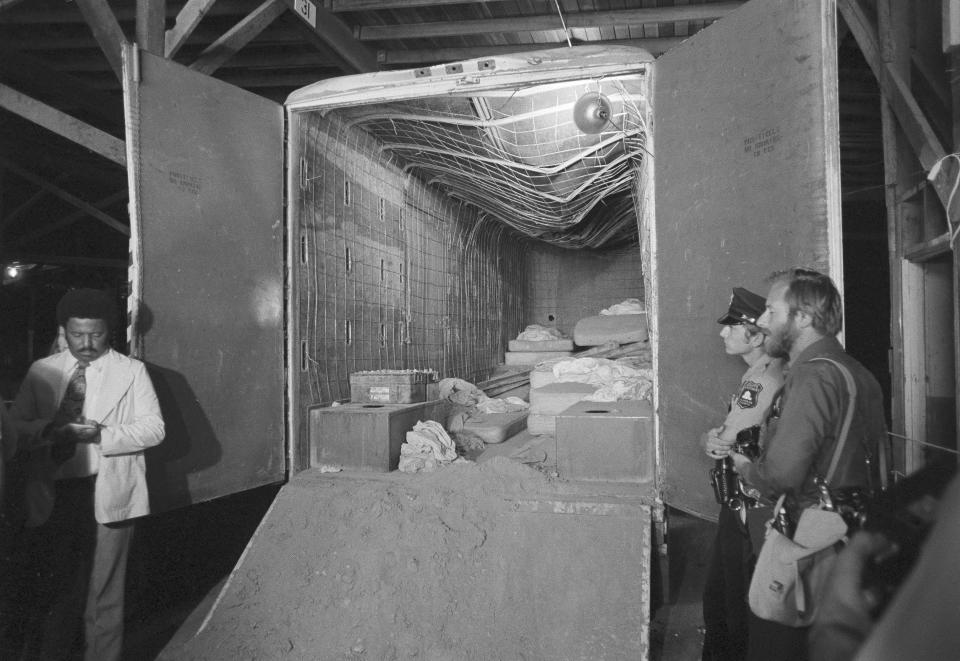Kidnapped and buried in 1976, a Chowchilla survivor now supports his captor's parole
Larry Park was just six years old when three men ambushed the school bus carrying him and 25 other children in Chowchilla, a town in central California.
The kidnappers buried them under mounds of dirt in a ventilated bunker in a quarry for a $5 million ransom. After about 16 hours underground, the children and the bus driver managed to escape by digging their way out.
Now, the last of the men convicted of the 1976 abduction still incarcerated, Frederick Woods, has been approved for parole. Park supported his release.
"What I would like is to be there when he walks out, hug his neck and send him off the right way into his freedom," Park, now 52, said.
Woods, 70, was recommended for parole on March 25 after previously being denied 17 times. He started serving his sentence in 1978 and has been held at California Men’s Colony, a state prison in San Luis Obispo.
►Woods granted parole: Man who kidnapped children, buried them alive officially granted parole
►Cowchilla kidnapping: Man who buried children alive for $5 million ransom approved for parole
The recommendation for parole still has to be considered by Gov. Gavin Newsom. The governor can't overturn the decision because it's not a murder conviction, but he can send it to the Board of Parole hearings for review.
Brothers Richard and James Schoenfeld, Woods' accomplices, were freed in 2012 and 2015, respectively. Park said he had dinner with the Schoenfeld brothers about a month ago.
Park was one of two survivors who advocated for Woods' release during the last parole hearing. There, he said he believed Woods had served enough time for the crime.
At the hearing, survivors and others opposing his release spoke about the long-term harm the kidnapping had done.
Jennifer Brown Hyde, a survivor against Woods' parole, said he has not made amends for his crime.
“He could have done much more,” she said. “Even the settlement paid to some of us survivors was not sufficient. It was enough to pay for some therapy but not enough to buy a house.”
Park said he had been to Wood's previous parole hearings, but had not backed his release because of his disciplinary infractions in prison.
"I asked him to stay out of trouble, and if he would stay out of trouble, I would advocate for his parole," Park said. "And he stayed out of trouble, so I stayed good with my word."

The road to forgiveness
Park said he thinks about the abduction every day, and he was angry about it for a long time.
For decades, Park said, he struggled with drug addiction and mental illness.
"I got to a point where it was it was either something had to change or I was gonna die," said Park, who wrote a memoir about the ordeal: "The Chowchilla Kidnapping: Why Me?".
After finding his faith, Park forgave his kidnappers about 11 years ago.
"These three men have been a part of my life my entire life," said Park, a pastor. "I either choose to resent and hate them and live in bitterness, or I choose to embrace them because either way, going forward, they're still going to be a part of my life."
Forgiveness marks "the resolution of grief" and allows people to move on with their lives, said Frederic Luskin, director of the Stanford Forgiveness Projects.
"Without forgiveness, you're constantly reliving the past," Luskin said. "You stop your ability to move ahead, so the past wounding dominates how you will evaluate and see your life now and moving forward."

For people with religious backgrounds, Luskin said, faith can play several roles in forgiveness, from providing a model for forgiving to offering social support within their religious community.
While forgiving implies being at peace with one's life and the people who've done you harm, Luskin said, it doesn't mean those people are absolved of responsibility.
"It doesn't mean that it was okay," Luskin said. "What it means is, at this moment, this is my life. I need to unburden my own heart so I don't move ahead in bitterness."
Still, for Park, the news of Woods' parole recommendation is bittersweet. He's relieved that there will be no more parole hearings to attend to and happy that Woods will finally enjoy his freedom. But he empathizes with other survivors because "I know that hurt them very much."
"I don't have any misconception that what I said or that my position was seen as favorable by everybody," Park said. "I have to go by my heart and the way that I feel."
With the prospect of Woods being freed, Park hopes he can continue to move on with his life. He acknowledged that though he forgave the men there is still pain in his life, but, he said, "there's hope beyond the pain."
"I am having a good life," Park said. "I see my blessings day after day after day after day. And, you know, it could not be this way if I had not forgiven those men."
More exclusive reporting from USA TODAY
She called him Daddy: 'Branded' victims, text messages helped end a human trafficking operation in Michigan
'This isn't your money!': He was a Las Vegas cop drowning in debt. Then he nearly scored 3 casino heists, police say.
'Politics is like a sport': Why this New Jersey political murder-for-hire scandal may just be starting
A reckoning in North Carolina: Slave auctions, an execution: A city wonders what to do with its former town hall
'I feel like I'm not free': They're out of prison, but still fighting to prove their innocence
Contributing: Associated Press
This article originally appeared on USA TODAY: Why Chowchilla bus kidnapping survivor supports his captor's parole

